#SecurityScan 100: Deep State, Sri Lankan President's Visit to India & more
24 Dec 2024 16:22:05
This article is a summary of important events that have taken place in last one week affecting, India's national security.
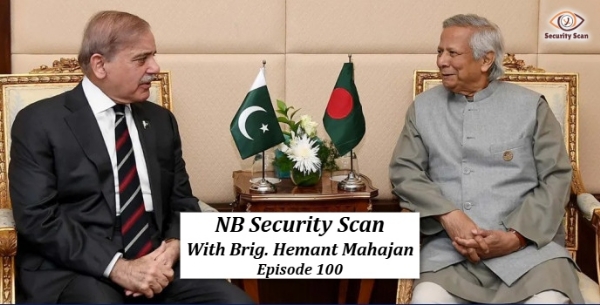
Topics Covered
1. The Deep State: A Mechanism to Protect Global Agendas and Vested Interests
2. Indian Fishermen Detained in Pakistani Jails
3. Heightened Terror Threat in Punjab
4. India May Acquire Russia's Voronezh Radar System: A Game-Changer for Air Defence
5. India China Talk-Resumption of High-Level Dialogue
6. Yunus and Shehbaz Sharif Discuss 1971 Issues in Cairo
7. Bangladesh’s Descent into Islamist Violence Against Hindus - a Geopolitical Nightmare for India
8. A Renewed Partnership: Sri Lankan President's Visit to India
9. Canada as the U.S.'s 51st State? Concerns and Context
Countering external & Internal Security Challenges
The Deep State: A Mechanism to Protect Global Agendas and Vested Interests
Understanding the Deep State
The "deep state" refers to an alleged network of unelected government entities and private organizations, such as financial services and defense industries, operating outside legal frameworks to further vested interests. This shadowy mechanism has been accused of undermining democratic processes, violating human rights, and perpetuating its global dominance for selfish gains.
Post-War Foundations of Deep State Influence
Following World War II, the United States emerged as the preeminent global power, commanding nearly 50% of the world's GDP, half of its gold reserves, and significant oil supplies. Leveraging this dominance, the U.S. established a series of institutions—such as the United Nations, International Monetary Fund (IMF), World Bank, and NATO—designed to shape the post-war international order. Alongside these, alliances were forged with nations like Japan, Pakistan, South Korea, and the Philippines to solidify influence in Asia.
During this period, the West embedded its ideological framework into the global order, including the Universal Declaration of Human Rights in 1948, which sought to establish universal norms transcending national sovereignty.
While these ideals seemed noble, they also empowered institutions dominated by Western influence to justify interventions in sovereign states under the guise of the "right to protect."
The Weaponization of Human Rights
Western-led international institutions, steeped in American values, often deemed non-compliant states as "autocratic" or "fascist" and justified interventions to "protect" their people. Over time, a sophisticated ecosystem evolved, consisting of NGOs, media outlets, rating agencies, multilateral organizations, politicians, and businessmen, all working in concert to maintain Western hegemony.
Sovereign governments that resisted were destabilized through mass protests or military interventions. The excuse of human rights protection provided a convenient cover for these actions.
Case Studies: Destabilization Under the Guise of Protection
Recent examples highlight how this system operates:
Bangladesh: Prime Minister Sheikh Hasina has openly accused the United States of orchestrating regime change to establish a strategic military base in South Asia.
Serbia and Kosovo: During the Balkan conflicts, NATO bombed Belgrade for 78 days, leading to the fragmentation of Serbia and the creation of Kosovo as a NATO-dominated enclave with Bondsteel, the largest NATO base in the region.
Middle East: Interventions in Afghanistan, Iraq, Libya, and Syria under the "right to protect" pretext resulted in regime changes and power centers that aligned with Western interests.
However, these actions often led to the erosion of human rights and democratic structures. In Afghanistan and Arab Spring nations, for instance, women’s rights and societal stability have drastically deteriorated.
Democracy in Disarray
Post-intervention governance structures in countries like Bangladesh, Ukraine, and others highlight the failure to uphold democratic norms:

Bangladesh: Lacks a legitimate government after alleged interference.
Ukraine: Delayed elections under President Zelensky have raised concerns about democracy.
Arab Spring Nations: Many transitioned into authoritarian regimes, suppressing freedom of speech and other fundamental rights.
The common thread is the installation of leaders who prioritize the interests of the deep state over their citizens.
India: A Target of the Deep State?
India, emerging as a significant player in the multipolar world order, faces similar challenges. The deep state appears to be leveraging misinformation and a nexus of NGOs, political opposition, and foreign funding to destabilize the nation. This strategy seeks to slow India's rise as a pole of authority, aligning with the vested interests of the West.
The Need for Vigilance
As history demonstrates, the deep state operates to maintain global power, often at the expense of sovereign nations and democratic principles. For India, recognizing and countering these destabilizing forces is critical. Indians must remain vigilant against misinformation and external attempts to erode the nation’s growing influence in the global arena.
Indian Fishermen Detained in Pakistani Jails
Currently, 209 Indian fishermen, primarily from Gujarat, are held in Pakistani jails. Tragically, two fishermen, also believed to be from Gujarat, have died in custody during their detention.
Consular Access Agreement and Prisoner Exchange
In a written response to the Lok Sabha, Minister of State (MoS) in the Ministry of External Affairs (MEA), Kirti Vardhan Singh, stated that according to the India-Pakistan agreement on consular access, signed on May 21, 2008, lists of civilian prisoners and fishermen held in each other's jails are exchanged on January 1 and July 1 every year.
Figures and Recent Deaths
The latest figures available, as of July 1, 2024, listed 211 "Indian/believed-to-be-Indian" fishermen detained in Pakistani jails, including seven believed to be from Tamil Nadu. However, the reply also noted that two fishermen from Gujarat, included in the July 1, 2024 list, have since died in Pakistani custody. This brings the current number of detained fishermen to 209.
Length of Detention
The reply further detailed the length of detention for the 209 fishermen currently held in Pakistan: 51 have been in Pakistani jails since 2021, 130 since 2022, nine since 2023, and 19 since 2024.
Heightened Terror Threat in Punjab
Terrorist groups, often collaborating with overseas-based gangsters, are posing a significant challenge to the Punjab Police. This resurgence of activity is particularly concerning for a state that endured a decade of militancy and is still recovering from its lasting effects. The targeting of police stations and posts in the Majha region, an area susceptible to cross-border smuggling of weapons, explosives, and drugs, represents a blatant attempt to undermine law enforcement morale and escalate tensions within the state.
Foreign Involvement and Pro-Khalistan Activity
According to senior police officials, these activities are attributed to pro-Khalistan groups supported by Pakistan’s Inter-Services Intelligence (ISI). Individuals based in Germany and other Western countries are also deeply involved, as evidenced by the recent arrest of three members of the Khalistan Zindabad Force terror module and the dismantling of an inter-state arms trafficking network.
Lessons from Past Attacks and the Need for Vigilance
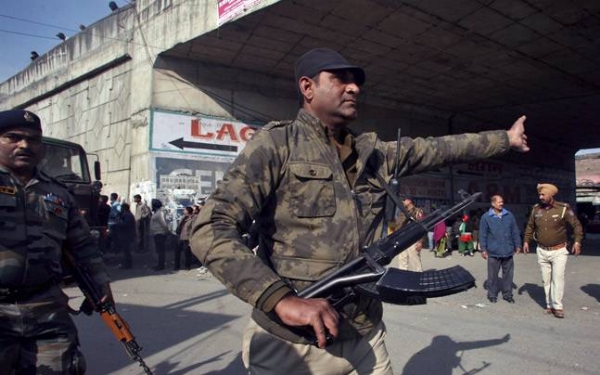
Two decades after suppressing militancy in the state, the Punjab Police were forced to confront renewed threats with attacks on the Dinanagar police station in Gurdaspur district in July 2015 and the Pathankot airbase just five months later. These incidents served as a stark reminder of the constant threat posed by anti-India elements. The current surge in terror-related activities is another urgent call to action, demanding increased vigilance and closer collaboration between the state police and central agencies such as the Border Security Force (BSF) and the National Investigation Agency (NIA).
Continued Threat of Extremism and the Police Response
The recent assassination attempt on former Deputy Chief Minister Sukhbir Singh Badal outside the Golden Temple underscores the fact that violent extremism remains a threat in Punjab. The remnants of radicalism persist, with ongoing efforts to revive the Khalistan movement. The responsibility lies with the police to uphold the rule of law and ensure the safety and security of the public.
India To Acquire Russia's Voronezh Radar System: A Game-Changer for Air Defence
India is in advanced discussions with Russia to acquire the state-of-the-art Voronezh early warning radar system. The $4 billion defence deal is poised to significantly enhance New Delhi’s air defence capabilities.
What is the Voronezh Radar System?
The Voronezh radar system, developed by Russia’s Almaz-Antey Corporation, is a cutting-edge, long-range early warning system. It boasts an impressive detection range of up to 8,000 kilometres and the capability to simultaneously track over 500 objects, including ballistic missiles and stealth aircraft.
First deployed in 2012, the Voronezh system has been gradually replacing older Soviet-era radar systems. Recent upgrades have introduced advanced components capable of operating across various frequency bands, from metre to centimetre wavelengths. This enables precise tracking of targets in air and near-space environments, along with calculations for potential interception.
The radar system plays a crucial role in verifying and responding to potential threats, such as mass launches of intercontinental ballistic missiles. Russia has already deployed at least ten Voronezh radar systems, reinforcing its early warning and missile defence network.
Why is India Interested in the Voronezh Radar System?
India’s interest in the Voronezh radar system stems from its need to modernise air defence infrastructure amid escalating security threats in the region.
A Russian delegation, led by Deputy Chairman Vladimir Medovnikov, recently visited India to meet with offset partners in Delhi and Bengaluru as part of the "Make in India" initiative. It is expected that 60% of the radar system’s components will be manufactured domestically. Reports suggest that the system may be installed in Chitradurga, Karnataka.
Strategic Importance for India
The radar system’s integration with satellite networks enhances its effectiveness. It can confirm or refute missile launch alerts detected by satellites, ensuring accurate threat assessment and timely interception.
Advanced early warning radar like Voronezh is crucial for maintaining technological parity and addressing evolving threats.
The radar’s space surveillance capabilities align with India’s growing space ambitions. Its ability to monitor terrestrial and space objects, including debris, could support both civil and military objectives, complementing the Indian Space Research Organisation’s (ISRO) expanding space programme.
Conclusion
The collaboration with Russia also underscores India’s commitment to modernising its defence infrastructure while promoting domestic manufacturing through the Make in India initiative.
India China Talk-Resumption of High-Level Dialogue
The recent meeting in Beijing between India's National Security Adviser, Ajit Doval, and Chinese Foreign Minister, Wang Yi, signifies a crucial development in India-China relations. This dialogue, the first in nearly five years since the 2020 Galwan Valley clash, indicates a measured but important move towards normalizing relations between the two Asian powers. The meeting centered on implementing the October 2024 disengagement agreement in Ladakh. Both sides pledged to uphold peace and tranquility along the Line of Actual Control (LAC), a vital measure to prevent future escalations.
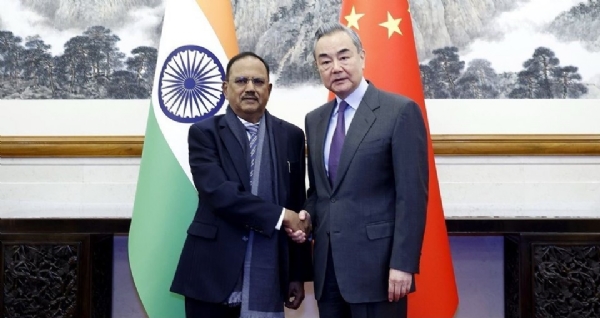
Key Outcomes and Agreements
The discussions also highlighted a six-point consensus aimed at enhancing cooperation in several areas. These include border trade, data sharing concerning trans-border rivers, and the resumption of the Kailash Mansarovar Yatra. These agreements represent tangible progress and demonstrate a willingness to engage on practical matters.
Persistent Challenges and the Path Forward
Despite these positive developments, significant challenges remain. The border dispute continues to be a complex and sensitive issue, complicated by historical grievances and mutual distrust. The focus on confidence-building measures and a "step-by-step" approach reflects a pragmatic diplomatic strategy. However, translating these commitments into concrete actions will require sustained political will and careful monitoring.
Yunus and Shehbaz Sharif Discuss 1971 Issues in Cairo
Bangladesh has reiterated its call for Pakistan to address the unresolved issues from 1971, aiming to foster a more positive relationship for future generations. This discussion took place between Bangladesh Chief Adviser Muhammad Yunus and Pakistan Prime Minister Shehbaz Sharif during the D-8 Summit in Cairo.
Key Points from the Meeting:
1971 Issues: Yunus emphasized the need to settle historical grievances, stating that these issues have repeatedly resurfaced and hindered progress. He urged for a resolution "once and for all."
Pakistan's Stance: Sharif acknowledged the 1974 tripartite agreement between Bangladesh, Pakistan, and India as a means of resolution but expressed willingness to discuss any other outstanding concerns.
Regional Cooperation: Both leaders discussed the revival of the South Asian Association for Regional Cooperation (SAARC), with Sharif suggesting the possibility of hosting a summit.
Strengthening Bilateral Ties: The two leaders agreed on enhancing trade, commerce, and cultural exchanges. Sharif expressed a desire to strengthen ties, referring to Bangladesh as a "brother-in-country."
Facilitation of Trade: Sharif thanked Yunus for facilitating trade and travel, including easing inspection requirements for consignments from Pakistan.
Sharif also extended an invitation to Yunus to visit Pakistan, highlighting the importance of improving air travel for Pakistani passengers to Bangladesh.
Bangladesh’s Descent into Islamist Violence Against Hindus
A Geopolitical Nightmare for India
An unstable Bangladesh, mired in radical Islamism and political violence, has long been India’s geopolitical nightmare. Recent developments have exacerbated this concern. Instead of ushering in a democratic transition, the regime change has plunged Bangladesh into deeper chaos. Human rights abuses, lawlessness, and the rise of Islamist groups now threaten to turn the country into a new global flashpoint.
Sheikh Hasina: Balancing Authoritarianism and Stability
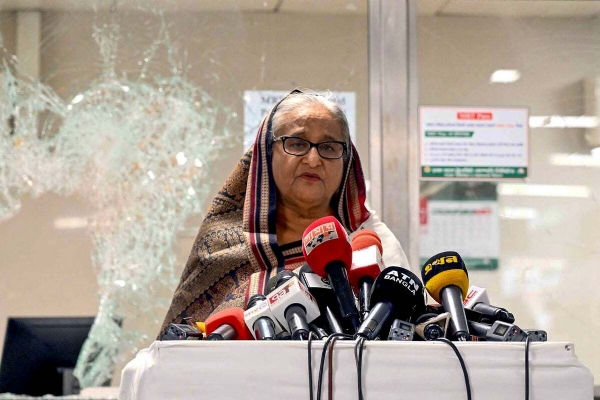
Sheikh Hasina, despite her authoritarian tendencies, had been a stabilizing force in Bangladesh. Once a pro-democracy leader who helped topple the military regime in 1990, Hasina later consolidated power as Prime Minister but kept both the powerful military and Islamist movements in check. Under her leadership, Bangladesh’s fragile stability was maintained.
In Bangladesh, the military refused to enforce a lockdown amid widespread protests. Once Hasina was ousted, it quickly installed an interim administration and ensured her departure to India before she could formally resign.
A Military-Mullah Nexus in Power
The interim regime is nominally led by Nobel Peace Prize laureate Muhammad Yunus, who rose to prominence with the support of a student-led, Islamist-backed protest movement. However, the 84-year-old Yunus serves merely as the civilian face of what is effectively a military-Islamist alliance. Despite lacking constitutional legitimacy, the interim administration has offered no timeline for national elections, deepening political uncertainty.
Curtailing Freedoms and Suppressing Dissent
The regime’s crackdown has extended to minority communities as well. Late last month, a Hindu monk was arrested on sedition charges after leading peaceful protests demanding protections for Bangladesh’s Hindu minority. This is part of a larger trend of targeted violence. Hindu communities, along with Buddhists, Christians, indigenous groups, and Islamic sects deemed heretical, have been subjected to attacks by jihadi mobs. At one anti-Hindu protest, Islamist marchers openly chanted, “Catch them and slaughter them.”
The Islamist Resurgence
The rise in Islamist violence is a direct consequence of the interim regime’s policies. It has lifted bans on jihadi groups with known links to terrorism and released radical Islamist leaders, including one convicted for murdering a secular blogger. The regime has also signaled plans to remove secularism from the country’s constitution, further emboldening extremist forces. In some instances, Islamists have enforced their radical ideology by targeting women for “immodest” attire, showcasing their intent to impose a rigid moral code on society.
Conclusion: A Call for Urgent Action
The developments in Bangladesh are a cause for global concern. The international community, particularly the United States, must act swiftly to prevent Bangladesh from becoming a hotbed of Islamist extremism and political instability. For India, the stakes are especially high, as a destabilized neighbor threatens regional peace and security. Urgent intervention is necessary to safeguard Bangladesh’s secular foundations and ensure a path toward stability and democracy.
A Renewed Partnership: Sri Lankan President's Visit to India
The meeting between Sri Lankan President Anura Kumara Dissanayake (AKD) and Indian Prime Minister Narendra Modi in New Delhi marks a significant moment in India-Sri Lanka relations. As Sri Lanka recovers from years of economic and political instability, President Dissanayake’s visit underscores Colombo’s confidence in India’s partnership for its recovery. Notably, this being his first international visit since assuming office in September highlights the importance he places on strengthening bilateral ties with India and reaffirming Sri Lanka’s dedication to a collaborative regional approach. President Dissanayake’s tribute to Mahatma Gandhi at Rajghat earlier in the day set a positive tone for the visit.
Focus on Economic Cooperation and Regional Security
The discussions between Modi and AKD centered on enhancing economic cooperation, exploring investment opportunities, and reinforcing regional security. This focus reflects their shared desire for prosperity and stability in the Indian Ocean Region. External Affairs Minister S Jaishankar’s prior visit to Colombo had already emphasized India’s commitment to Sri Lanka’s economic revitalization and paved the way for this productive dialogue.
Sri Lanka's Strategic Importance and New Leadership
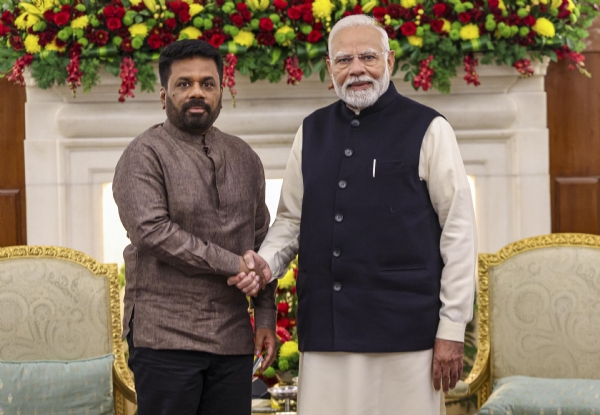
Sri Lanka’s position as India’s closest maritime neighbor gives it a central role in New Delhi’s strategic calculations, encompassing everything from promoting trade to ensuring regional security. President Dissanayake is known for his pragmatic leadership. Grounded in leftist ideology and focused on anti-corruption reforms, his leadership signals a departure from the dynastic politics that have historically characterized Sri Lankan governance. This aligns well with Modi’s own grassroots background, creating opportunities for renewed cooperation, particularly in addressing economic reconstruction and ensuring regional stability.
India's Continued Support for Sri Lanka's Recovery
The meeting reaffirmed Delhi’s support for Sri Lanka’s economic recovery, recalling India’s $4 billion assistance during the 2022 crisis and its role in facilitating an IMF bailout. By pursuing mutual interests and prioritizing sustainable solutions, India and Sri Lanka are well-positioned to forge new avenues for cooperation in a rapidly evolving geopolitical environment.
Canada as the U.S.'s 51st State? Concerns and Context
Recently, Donald Trump made a controversial remark during a dinner with Canadian Prime Minister Justin Trudeau, joking about Canada potentially becoming the U.S.'s 51st state to avoid tariffs. This comment surfaced after Trump threatened to impose tariffs on Canadian imports, prompting Trudeau to seek an urgent meeting. But what led to this exchange, and why did it cause concern among some Canadians?
The Dinner Meeting
Trump and Trudeau met at Mar-a-Lago, Florida, accompanied by several key figures from Trump's administration. The discussion centered around Trump's threats to impose tariffs on goods entering the U.S. from Canada and Mexico, which he claimed were necessary to combat drug trafficking and immigration issues. Trudeau aimed to persuade Trump that the Canadian border was not comparable to the U.S.-Mexico border, arguing that such tariffs could devastate the Canadian economy.
Economic Implications
During the dinner, Trudeau highlighted that Canada supplies approximately four million barrels of oil to the U.S. daily and possesses significant reserves of essential minerals. These resources are critical for various industries, including clean energy and military defense. In 2022, Canada exported $170 billion worth of energy products to the U.S., making it a crucial partner in North American trade.
Historical Context
Concerns about Canada becoming the 51st state are not new. They resurfaced during the 1988 election when the Canada-U.S. Free Trade Agreement was negotiated. Critics at the time warned that increased trade could diminish Canada’s autonomy, leading to fears of becoming overly reliant on the U.S. market.
More recently, Trudeau's government had to navigate complex trade negotiations, successfully advocating for Canada's interests during the renegotiation of the North American Free Trade Agreement (NAFTA). Nonetheless, with political pressures mounting and an election looming, Trudeau’s position is more precarious than in the past.
Perspectives on Tariffs
Despite Trudeau’s efforts to convey the importance of the Canadian economy, Trump’s administration continued to frame the tariff discussion around national security concerns. Trump echoed his commitment to imposing tariffs if necessary, which Trudeau's government argues would harm both economies.
A Broader Perspective
The differences between the Canadian and Mexican borders in terms of immigration and drug trafficking were also highlighted. While U.S. customs agents reported far more encounters with migrants at the southern border, Canadian officials insisted that their country was not a significant contributor to drug trafficking issues.
Conclusion
Trump’s remark about Canada becoming the 51st state may have been intended as a joke, it touched on underlying tensions about trade, identity, and national sovereignty. As Canada navigates its relationship with a potentially unpredictable U.S. administration, these discussions will remain pivotal in shaping the future of North American relations.
--
